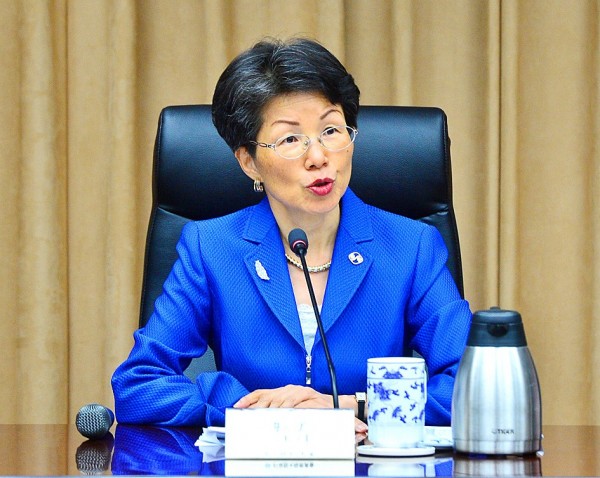《TAIPEI TIMES 焦點》 No issues are off limits: MAC Minister Chang

Mainland Affairs Council Minister Katharine Chang speaks at a news conference in Taipei yesterday. Photo: Wang Yi-sung, Taipei Times
GOOD NEIGHBOR: The council is to assist in the passing of reforms to extend National Health Insurance coverage to Chinese students to create a more friendly environment
By Lin Liang-sheng and Jonathan Chin / Staff reporter, with staff writer and CNA
Mainland Affairs Council (MAC) Minister Katharine Chang (張小月) yesterday said no issues are off limits for cross-strait interactions as long as they are conducted without any political preconditions and based on the general principle of “seeking common ground, while setting aside differences.”
Chang made the remarks at a year-end news conference in Taipei, reiterating the government’s commitment to its Taiwan-China relations guideline of “no changes being made to our promises or friendliness, but refusing to surrender or seek confrontation.”
“Taiwan has been making overtures in good faith to China, but our counterparts across the strait have not responded in the same spirit of friendliness,” Chang said.
“It is incumbent on [Beijing] to adopt different ways of thinking in the interests of peace and stability in the Taiwan Strait. As long as there are no political preconditions and the principle of seeking common ground, while setting aside differences is observed, no subject should be closed to discussion in the interest of maintaining a dialogue,” she said.
Common ground that both sides might agree on is the importance of peace and stability in the region, while Beijing’s “one China” principle and the so-called “1992 consensus” are differences that should be set aside, Chang added.
The so-called “1992 consensus,” a term former Mainland Affairs Council chairman Su Chi (蘇起) in 2006 admitted making up in 2000, refers to a tacit understanding between the Chinese Nationalist Party (KMT) and the Chinese government that both sides of the Taiwan Strait acknowledge there is “one China,” with each side having its own interpretation of what “China” means.
Acknowledging “shifting conditions” in the domestic politics of Taiwan, China and abroad, Chang reaffirmed that Taipei would cautiously handle cross-strait issues and pursue a constructive dialogue in the interest of maintaining security and stability in the Taiwan Strait.
Although China has not relented in its “restrictive actions” against Taiwan, Taipei’s policy of welcoming and maintaining existing channels of communication remains unchanged, Chang said, adding that the government’s actions “have been lauded by the Taiwanese public and the international community.”
Relevant agencies have succeeded in keeping already established cross-strait agreements in effect and communicating with their Chinese counterparts, while actively pursuing negotiations on agendas that are of concern to the public’s interests, she said.
The council is to cooperate with legislative efforts to pass a proposed law to provide oversight over cross-strait negotiations and agreements, which would ensure “transparency, democratic participation and legislative accountability” in diplomacy with China, Chang said.
The council is to assist in passing amendments to the National Health Insurance Act (全民健康保險法) that would extend to Chinese students coverage in the National Health Insurance program, which covers foreign and overseas Chinese compatriot students, Chang said, adding that legal reviews of regulations to create a more friendly educational and social environment are to be conducted by the Ministry of Education.
The council plans to propose legal changes to protect the rights of Chinese spouses in Taiwan, she said.
To maximize Taiwan’s advantages as a pluralistic and democratic society, the council plans to promote youth exchanges in the legal profession, cultural industries and volunteer services for charitable causes, Chang said, adding that the government would review cross-strait trade and economic exchange policies, due to possible developments in the global, regional and Chinese economies.
新聞來源:TAIPEI TIMES















